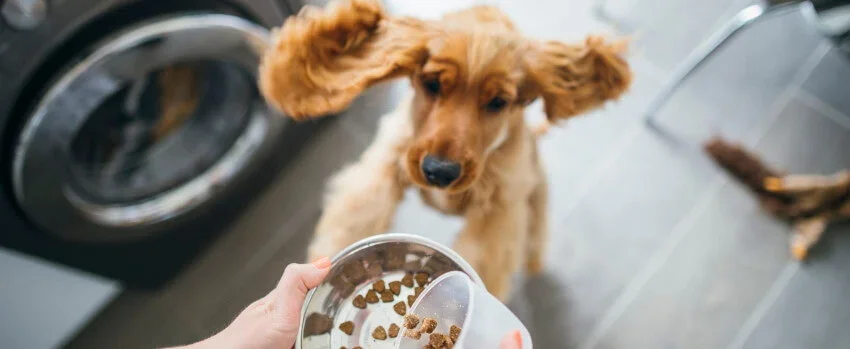Last Updated: 03/06/2025
How To Keep Your Dog's Teeth Clean & Healthy
Learn how to take care of your dog's teeth
Author: Dr Teagan Lever BVSc (Hons)
Reading Time: 12 minutes - short read
There's nothing quite like a happy, slobbery welcome home from your dog, but bad breath can certainly spoil the moment. Unfortunately, that "dog breath" is often a sign of dental disease, a surprisingly common problem affecting about 80% of dogs over three years old. What exactly is dental disease in dogs, and how can you keep your furry friend's mouth healthy and their kisses fresh?
What is Dental Disease?
When vets talk about dental disease, they are referring most commonly to gingivitis and periodontitis.
Gingivitis is inflammation of the gums, usually the result of a build up of bacteria containing plaque around the gumline of the teeth but can also be caused by some viruses and other health conditions. Preventing and treating gingivitis is key to managing your dog's dental health.
Periodontitis is what happens if gingivitis is left unchecked. The bacteria causing the gingivitis invade below the gumline, resulting in more inflammation and damage to the tissue that attaches the tooth to the gum, leading to loose teeth and ultimately teeth falling out. On the surface, as the plaque is left in situ, it begins to react with minerals in the saliva to form a hard, yellowish material known as tartar or calculus.
Signs of Dental Disease in Dogs
The most common sign of early dental disease noticed by dog owners is foul-smelling or 'fishy' breath. Other common indicators of dental disease are discoloured or stained teeth and red, inflamed gums.
It's important to check your dog's teeth and gums regularly for signs of dental disease, because although dental disease can be very painful, most dogs will continue to eat their food as normal and show no outward signs that something is wrong. Over time, dental disease results in chronic inflammation that can have serious health consequences for your pet including damage to the heart, kidneys and liver.
Good Teeth = A Longer Life Providing your pet with good dental hygiene can add 2-4 years to their life!
How to take Care of your Dog's Teeth

One of the first steps to formulating a dental care plan for your dog is to have your vet check their teeth. The vet will be able to assess whether your dog has dental disease, and what grade. Some vet clinics even offer free dental checks with a veterinary nurse.
If your dog has gingivitis or extensive disease, no home treatment can fix it; your dog will need a scale and polish at the vet. This involves using dental equipment - the same equipment that human dentists use - to scale off tartar and polish the tooth surface, while under anaesthesia.
Your vet will be able to get under the gumline if there is inflammation and really clean out any plaque and bacteria to ensure your pet's teeth are sparkling white and healthy.
Anaesthesia or heavy sedation is essential to allow thorough cleaning and examination of the teeth, particularly of areas under the gumline.
Pet dentistry should only be performed in a veterinary surgery to ensure all the surfaces of the teeth are cleaned and assessed. Be sure to steer clear of people offering anaesthesia free or 'gentle dentals'.
1. Daily toothbrushing
Veterinary dentists recommend brushing your dog's teeth with a toothbrush daily to prevent dental disease, and it makes sense: after all, we brush our own teeth twice daily to prevent plaque and tartar build up. When brushing your dog's teeth, be sure to use a dog friendly toothpaste, as human ones are not suitable.
It can take a while to get your dog used to having their teeth brushed, start out slowly with short sessions to get them used to the taste of the toothpaste and sensation of the brushing. Although it may seem daunting at first, with a little patience and encouragement most dogs can be trained to accept toothbrushing as part of their daily routine.
2. Therapeutic dental diets
For dogs with a history or increased risk of dental disease, therapeutic dental diets are the way to go.
Therapeutic dental diets offer other health benefits in addition to better dental health for your dog! As well as being proven to reduce dental plaque and tartar build up, Royal Canin Veterinary Dental Canine Small Breed is formulated to help reduce the risk of bladder stones and contains a skin support complex for healthier skin and a shiny coat. Royal Canin Veterinary Dental Canine is designed for dogs over 10kg and is fortified with omega fatty acids, glucosamine and chondroitin to support joint health, as well as highly digestible proteins, prebiotics and fish oil for digestive health.
Hill's Prescription Diet Canine t/d Dental Care and t/d Dental Care Small Bites are clinically proven to reduce gingivitis by mechanically scrubbing the teeth as your dog chews and also contain clinically proven antioxidants to promote a healthy immune system.
*While they are suitable for most healthy adult dogs, as these are specialised therapeutic diets, please consult your veterinarian to make sure that they are suitable for your dog's specific needs before use.
3. Oral care diets

If your dog does not have a history of dental disease but you want to throw in an extra ounce of prevention to take care of their dental health, an oral care diet is a great option for your dog.
Oral care diets offer a lot of the benefits of therapeutic dental diets, namely reduced plaque levels and excellent complete and balanced nutrition. Much like therapeutic diets, oral care foods for dogs are best fed as your dog's main food to ensure optimal results. If you do mix feed with wet food, feed your wet food at a different meal time to the dry oral care food.
4. Dental treats and chews
Dental treats can do a lot for your dog's dental health, if your dog uses them correctly. Dental chews work by scraping against the tooth to mechanically remove tartar and plaque. If your dog wolfs down a treat quickly, this scraping action won't be achieved and there will be no dental benefit whatsoever. Some recommended brands of dental treats include Oravet, Greenies, Whimzees, Veggiedent and Prozym.
The longer your dog takes to chew and grind their teeth on a dental chew or treat, the more benefit there is likely to be. For best results, be sure to follow the guidelines on the packet for the correct size and feeding frequency, and be mindful that treats will add to your pet's daily calorie count.
5. Water additives and plaque control supplements

While they won't reverse dental disease that is already present in your dog's mouth, water additives and plaque control supplements are a simple way to help freshen your dog's breath and can even help to slow the growth of bacteria and formation of plaque. When using water additives your dog's water bowls should be changed daily and with each refill you will need to add more of the solution.
Recommended brands include Aquadent, Prozym Dental Solution and Plaqueoff.
6. Dental chew toys
Regular chewing can help to mechanically remove plaque from the surface of your dog's teeth to prevent staining and tartar build up. Be sure to choose a dental toy that is designed for your dog's size and age to avoid any damage to the teeth or the gums.
Will bones clean my dog's teeth? While they might help keep your pooch's teeth clean, chewing on raw bones comes with a number of risks, not just for your dog but for you and your family too! For more information read Are Raw Bones Safe for Dogs?
Remember if you suspect your dog has signs of dental disease or if you are unsure, consult with your veterinarian or ask a Pet Circle Vet about the best prevention program for your dog's individual needs.
History
Our experts continually monitor the health and wellness space and we update our articles when new information becomes available.
Tue Jul 23 2024
Edited by Dr Teagan Lever BVSc (Hons)Dr Teagan Lever BVSc (Hons)
Head Veterinarian, BVSc (Hons)
Pet Circle's Head Veterinarian, Dr Teagan graduated from the University of Queensland in 2010 and went on to work in small animal and mixed practice in various locations around QLD & ACT before joining Pet Circle in early 2016. Dr Teagan has special interests in dermatology, nutrition and preventative health care. She feels privileged to witness the special bond people share with their pets on a daily basis and enjoys forming lasting relationships with pet parents and their fur children.

